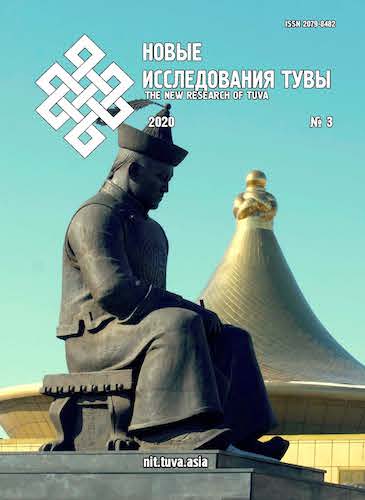Formation and development of the cinema network in the Tuvan People's Republic
DOI:
https://doi.org/10.25178/nit.2020.3.6Keywords:
culture-building; film installations; cinema; film repertoire; movie circuit; history of the cinema; Tuva; history of Tuva; Tuvan People’s Republic; Tuvans; Great Patriotic warAbstract
This article examines the history of the cinema network in the Tuvan People's Republic, including the years of the Great Patriotic War. The article is based on the analysis of printed materials and archival sources, with some of the latter never been studied before. Another important source are eyewitnesses’ memories.
The earliest stationary cinema installation appeared in Tuva in 1925, at the Soviet citizens’ club. The documentaries run there were supplied by the USSR. In 1930, TuvGosKino (Tuvan Cinematographic Office) was set up, the plan of cinema development was drawn up, and a number of organizational issues resolved, such as the Office’s equipment, budget, supply lines, film quality and Tuvan translation. The first cinema was opened in Kyzyl in 1931, and two mobile installations went operational the same year. A whole network of installations had been in place by mid–1930s, with material basis a lot improved. At the celebration of TPR’s 15th anniversary in 1936, the Soviet delegation presented new equipment. Soviet camera crews made a number of films on Tuva. Between 1932 and 1937, the number of mobile cinema installations in Tuva increased twofold. With the spread of cinema across the republic, the problem of cadres got increasingly urgent.
During the war years, cinema had to deal with war-related issues. The whole cinema network experienced a drastic change, just as it happened to the repertoire selection and film distribution. The wartime repertoire was a crucial factor in the patriotic education. After the war, Tuva’s cinema network joined its larger counterpart of the USSR and continued as part of the single Soviet film distribution system.
References
Anchima, Kh. A. (1970) Kul'turnoe stroitel'stvo v Sovetskoi Tuve [Cultural construction in Soviet Tuva]. In: V bratskoi sem’e narodov [In the brotherly family of peoples]. Ed. by S. K. Toka. Kyzyl, Printing office of the press Department of the Council of Ministers of the Tuvan ASSR. 213 p. Pp. 55–69. (In Russ.).
Aranchyn, Yu. L. (1982) Istoricheskii put' tuvinskogo naroda k sotsializmu [The historical path of the Tuvan people to socialism]. Novosibirsk, Nauka. 337 p. (In Russ.).
Badyrgy, M. M. and Munge, B. V. (2020) Dokumenty Natsional'nogo arkhiva Respubliki Tyva po kul'turnomu stroitel'stvu Tuvinskoi Narodnoi Respubliki [“Cultural Upbuilding” in People’s Republic of Tuva in documents preserved at National Archives of Republic of Tuva]. The New Research of Tuva, no. 2, pp. 145–164. (In Russ.). DOI: www.doi.org/10.25178/nit.2020.2.10
Buraeva, C. V. and Baturin, S. A. (2017) Buriatiia v prostranstve dokumental'nogo sovetskogo kino (1923–1941 gg.) [Buryatia in the space of documentary Soviet films (1923–1941)]. Vestnik Vostochno-Sibirskogo gosudarstvennogo instituta kul'tury, no. 4, pp. 62–71. (In Russ.).
Vvedenie [Introduction] (2007). In: Uriankhai. Tyva depter [Uriankhai: The Tuvan Notebook]: in 7 vols. / comp. S. K. Shoigu. Moscow, Slovo. Vol. 6. Tannu-Tuvinskaia Narodnaia Respublika (1921–1944 gg.) [Tannu-Tuva People's Republic (1921–1944).]. 584 p. Pp. 29–127. (In Russ.).
Galkin, A. V. (2009) O rabote kinoseti Chuvashii v gody Velikoi Otechestvennoi voiny [On the work of the film network of Chuvashiya within Great Patriotic War]. Vestnik Chuvashskogo universiteta, no. 3, pp. 35–39. (In Russ.).
Istoriia Gornogo Altaia [History of the Altai Mountains] (2014) / A. P. Adlykova, T. V. Ankudinova, A. G. Gonokhov et al. Gorno-Altaisk, Gorno-Altaisk state University. 480 p. (In Russ.).
Istoriia Tuvy [The History Of Tuva] (2007): in 3 vols. / ed. by V. A. Lamin. Novosibirsk, Nauka. Vol. 2. 430 p. (In Russ.).
Kino: Entsiklopedicheskii slovar' [Cinema: An Encyclopedic dictionary] (1986) / editor-in-chief S. I. Yutkevich; editorial board: Yu. S. Afanas'ev, V. E. Baskakov, I. V. Vaisfel'd et al. Moscow, Sovetskaia entsiklopediia. 838 p. (In Russ.).
Kinoset' [Cinema] (1973). In: Bol'shaia sovetskaia entsiklopediia [Great Soviet encyclopedia]: in 30 vols. / ed. by A. M. Prokhorov. Moscow, Sovetskaia entsiklopediia, 1969–1978. Vol. 12. 624 p. Pp. 138. (In Russ.).
Kosykh, E. N. and Fadeev, K. V. (2005) Sibirskii kinematograf: 1896–1917 gg. [Siberian cinema: 1896–1917]. In: Protsessy urbanizatsii v Tsentral'noi Rossii i Sibiri: sbornik statei [Processes of urbanization in Central Russia and Siberia: a collection of articles] / ed. by V. A. Skubnevskii. Barnaul, Publishing house of the Altai University. 319 p. Pp. 305–318. (In Russ.).
Kuzhuget, A. K. (2006) Dukhovnaia kul'tura tuvintsev. Struktura i transformatsiia [The immaterial culture of Tuvans. Structure and transformation]. Kemerovo, KemGUKI. 319 p. (In Russ.)
Kyzyl — stolitsa Sovetskoi Tuvy [Kyzyl, the capital of Soviet Tuva] (1964) / Ochur V. Ch., Rovnov V. I., Serdobov N. A. et al. Kyzyl, Tuva book publishing house. 129 p. (In Russ.).
Mannai-ool, M. Kh. (2001) Uchenyi komitet TNR i ego rol’ v sotsial’no-ekonomicheskom razvitii Tuvy [The TPR Academic Committee and its role in socioeconomic and cultural development of Tuva]. In: Gumanitarnye issledovania v Tuve: sbornik nauchnykh statei [Humanities Research in Tuva: collected scholarly articles]. Ed. by K. A. Bicheldei, B. I. Tatarintsev and S. M. Biche-ool. Moscow, RUDN. 336 p. Pp. 102–104. (In Russ.).
Menkhen-Khel'fen, O. (2007) Puteshestvie v aziatskuiu Tuvu [A Journey to Asian Tuva]. In: Uriankhai. Tyva depter [Uryankhai: A Tuvan Notebook]: in 7 vols. / comp. by S. K. Shoigu. Moscow, Slovo/Slovo. Vol. 6. 584 p. Pp. 222–351. (In Russ.).
Mollerov, N. M. (1988) Ochagi sotsialisticheskoi kul'tury RSTK v TNR (1922–1932) [Centers of socialist culture of the RSTC in TPR (1922–1932)]. In: Kul'tura tuvintsev: traditsiia i sovremennost' [Culture of Tuvans: tradition and modernity] / ed. by Yu. L. Aranchyn. Kyzyl, Printing house of the state Committee of The Tuvan ASSR. 152 p. Pp. 100–109. (In Russ.).
Potapov, L. P. (1953) Sotsialisticheskoe pereustroistvo kul'tury i byta tuvintsev [The socialist reconstruction of the culture and life of Tuvan people]. Sovetskaia etnografiia, no. 2, pp. 72–102. (In Russ.).
Serdobov, N. A. (1971) Istoriia formirovaniia tuvinskoi natsii [The history of the formation of the Tuvan nation]. Kyzyl, Tuvan book publisher. 482 p. (In Russ.).
Stalin, I. V. (1953) O Velikoi Otechestvennoi voine Sovetskogo Soiuza (doklady, rechi, vystuplenie i prikazy) [About the Great Patriotic War of the Soviet Union (reports, speeches, speeches and orders)]. Moscow, Gospolitizdat. 209 p. (In Russ.).
Toka, S. K. (1970) Torzhestvo leninskoi natsional’noi politiki KPSS [The triumph of Leninist national politics of the CPSU]. In: V bratskoi sem’e narodov [In the brotherly family of peoples]. Ed. by S. K. Toka. Kyzyl, Printing office of the press Department of the Council of Ministers of the Tuvan ASSR. 213 p. Pp. 7–17. (In Russ.).
Khovalyg, S. S. (2020) Problemy khraneniia tekhnotronnykh dokumentov v arkhivakh Tuvy [Preserving technotronic documents in the archives of Tuva]. The New Research of Tuva, no. 2, pp. 63–74. (In Russ.). DOI: www.doi.org/10.25178/nit.2020.1.4
Khramkova, N. P. and Zavodchikov, V. V. (2017) Kadrovoe obespechenie sistemy kinoobsluzhivaniia naseleniia srednego Povolzh'ia v gody Velikoi Otechestvennoi voiny [Staffing the cinema entertainment system of the population of the middle Volga region during the Great Patriotic War]. Obshchestvo: filosofiia, istoriia, kul'tura, no. 4, pp. 98–103. (In Russ.). DOI: www.doi.org/10.24158/fik.2017.4.24
Entsiklopediia Respubliki Khakasiia [Encyclopedia of the Republic of Khakassia] (2007) : in 2 vol. / editor-in-chief V. A. Kuz'min. Krasnoiarsk, Polikor. Vol. 1. 432 p. (In Russ.).
Published
How to Cite
For citation:
Munge B. V. and Mongush A. M. Stanovlenie i razvitie kinofikatsii v Tuvinskoi Narodnoi Respublike [Formation and development of the cinema network in the Tuvan People's Republic]. New Research of Tuva, 2020, no. 3, pp. 81–100. (In Russ.). DOI: www.doi.org/10.25178/nit.2020.3.6
Issue
Section

This work is licensed under a Creative Commons Attribution-NonCommercial 4.0 International License.

Author(s) license holder(s) grant rights for their work to the journal (grantee of a license) under the simple non-exclusive open license in accordance with Art. 1286.1 «Open license for a research work, work of literature or fine arts», Civil Code of the Russian Federation.
New Research of Tuva publishes articles under the Creative Commons Attribution-NonCommercial license (CC BY-NC).
Since it is an open license, author(s) reserve the right to upload the article to their institutional repository, submit it to another journal (if it allows republications), or republish it on their own website (in full, or in part).
However, several conditions apply here:
a) The republished version must always contain the name(s) and affiliation(s) of the author(s), the original title and the hyperlink to the original version on the New Research of Tuva website;
b) It must be in open access, free of charge, and no category of readers must be in any way whatsoever advantaged over general readership.
c) should the contribution be submitted elsewhere by its author(s) without substantial modification (30% or more of original text unchanged), the body of the article should contain a disclaimer that the original version was published in New Research of Tuva (with a link to the respective page)
The CC-BY-NC is a non-revocable license which applies worldwide and lasts for the duration of the work’s copyright.










